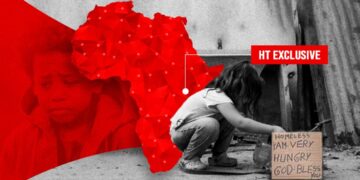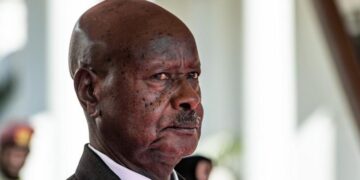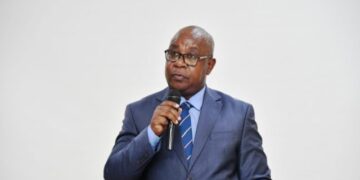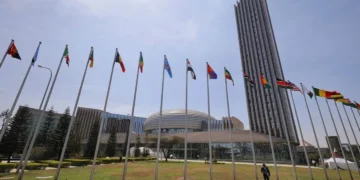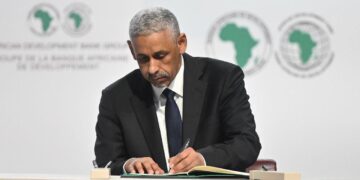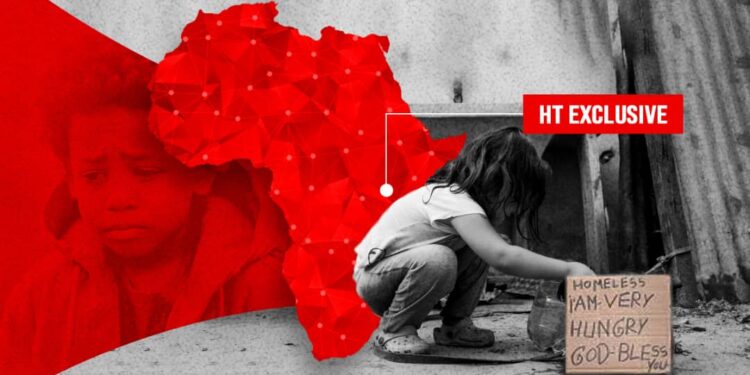By Enyichukwu Enemanna
The recent sentencing of 88 young Ugandan mothers to community service for using children to solicit alms in public places has again highlighted twin problems of poverty in Africa and hyper pro-activeness of the judiciary on matters concerning individuals in the lower ladder of the society, while the rich employ various measures to evade justice as we have repeatedly seen in the legal jurisprudence.
The City Hall Magistrates Court in Kampala, Uganda’s capital, had last week handed down one month community service sentences to the 88 individuals involved in the act, after they had pleaded guilty to sending their children to solicit money from public places. Before they were sentenced, the mothers were remanded for three weeks, following their arrest during the smart city campaign in preparation for Non-Aligned Movement (NAM) Summit which held January 19-20, 2024.
The Heritage Times HT recalls that as the current Chair of the NAM from 2024-2027, Uganda hosted the Summit with the theme, ‘Deepening Cooperation for Shared Global Influence’. A group of 25 countries established the NAM at the group’s first Summit, which convened in September 1961 in Belgrade, then Yugoslavia.
Uganda in an apparent desperation to create the impression to its international visitors that it has phased out street begging had engaged in the window dressing that saw the arrest and conviction of the 88 women, a measure seen as not proffering solution to the deep-rooted social problem of poverty in the East African country.
READ ALSO: Where Is Niger’s Mohammed Bazoum?
The Grade One Magistrate, Edgar Karakire had found the individuals guilty under the Kampala Capital City Child Protection Ordinance 2022, which prohibits the use of children for begging or soliciting alms in public spaces. The ordinance, aimed at safeguarding the welfare of children, imposes strict penalties on those found in violation, including imprisonment and fines, the authorities said in reaction to the arrest and conviction.
Authorities announced that with the sentencing of these women, a total of 66 rescued children will now be reunited with their families. “These children, who were once subjected to the indignity of begging on the streets, will now have the opportunity to reclaim their childhoods and receive the care and support they deserve,” Kampala Capital City Authority (KCCA) said in a statement posted on its website.
It added, “Under the provisions of the ordinance, children found loitering, begging, or engaging in other hazardous activities on the streets are to be rescued and provided with appropriate diversion programs by probation and social welfare officers.”
Uganda Not Alone
There is a sweeping poverty across countries in Africa, exacerbated by poor leadership, corruption, inflation, weakening local currencies, policy instability and sit-tight syndrome that has seen leaders on the continent to perpetuate themselves in office either by use of force and illegal change of Constitution.
Hardly is there any major city across Africa, including the capitals where street begging is not seen, if not fully institutionalised, indicating a disturbing level of poverty confronting the continent amidst abundant resources underneath the earth, rich mineral deposits that have largely remained under-tapped for decades.
According to the 2023 report of the Multidimensional Poverty Index (MPI), of the top 30 poorest countries in the world, 23 are from Africa, representing 76.6% of the total countries on the list. Additionally, the report says across 110 countries, out of 6.1 billion people, nearly 1.1 billion people suffer from extreme poverty. Among this 1.1 billion poor people, almost 534 million are from Sub-Saharan Africa while the remaining 389 million poor people come from South Asia. The implication therefore is that, almost five out of every six poor people reside in Sub-Saharan Africa or South Asia.
The MPI global index report further says, “Africa is rich in resources such as minerals, gold, and petroleum, however, the continent has been inefficient in capitalizing its resources to the maximum. Africa has advanced in recent years which has led to a significant decrease in poverty in some of the countries in the region. Still, Africa must enhance development to improve and sustain economic growth in the coming years. 2023 has been a bumpy year for activity in African economies due to high inflation, and the after-effects of Russia’s war in Ukraine.
“Now, the situation is critical in the region with Israel’s continuous bombing of Gaza’s citizens. The ongoing global conflicts which involve wars in Ukraine and Palestine have prompted market uncertainties, lag in international demand, and elevated spreads, among many other uncertainties.”
According to IMF database, the landlocked East African country of Uganda with a 2023 GDP of $145.16 billion and a GDP per capita of $3,220 is one of the poorest countries in Africa. Along with Rwanda, Guinea-Bissau, The Gambia, Togo, Zimbabwe, Burkina Faso, Mali, Sierra Leone and Somalia, it leads among 20 poorest countries on the continent, according to 2023 GDP Per Capital.
‘Reason For Dangerous Journey’
A social affairs commentator and Abuja-based politician, Olabode Adeyemi told The Heritage Times HT that poverty is endemic in Africa and largely contributes to why so many persons are eager to flee the continent to Europe or other parts of the world in search of greener pasture. According to Adeyemi, the dangerous journey along the Mediterranean Sea is fuelled by the desperation to flee myriads of social problems bedevilling Africa, particularly poverty, hunger and insecurity.
He however faulted the clampdown on street beggars by governments across Africa where street begging has been made a punishable offence. According to him, using the instrumentality of the judiciary to chase beggars out of the street is counterproductive, as they would end up finding their way back and continue their trade.
He said, “I think what is important is that we must recognise the fact that poverty is an age-long social problem in Africa which deserves strategic policies to tackle. I find it appalling that instead of focusing on means of making the atmosphere conducive for commerce and industry to thrive, so that a larger majority of our people could be meaningful engaged, leaders are applying brute force to clear beggars off the street.
“What economic formular are they applying to arrive at the conclusion that forcefully arresting, trying and jailing street beggars automatically solves the problem of unemployment which they are facing because I believe that if they were employed, they won’t be in the street soliciting for alms.
“Lack of prudent management of our resources by our leaders has also brought about an atmosphere of economic disadvantage that has created a large disparity between the rich and the poor. For instance, Africa is the home of solid minerals but how many of such precious mineral deposits are mined, processed and refined in Africa for domestic use?
“We cannot be talking of defeating poverty with a mindset of laziness. We have allowed lack of creativity to rob us of our values abound in our mineral deposits. Why do we have to export raw mineral deposits and end up importing just part of products made from it? From crude oil for instance, a minimum of ten products can be made but our focus has always been on fuel and that is how it is with solid minerals.
“Policy inconsistency and desire by office holders to clinch on to power has not supported our drive to genuinely tackle poverty. In the case of Uganda for instance, President Yoweri Museveni has been in power since the 80s, yet his country ranks prominently as under-developed and poverty-stricken. With nearly 40 years in office, what new idea does he have to offer in dealing with nose-diving living standard in his country?
“So when people stake their lives in extremely dangerous routes just to leave the continent, I want you to bear in mind that there is a reason for it. The land offers them minimal hope. In any case, they prefer to die fleeing poverty than to die right inside poverty. That is basically what has fuelled illegal migration.”
According to the International Organization for Migration, more than 2,270 people died attempting to cross the central Mediterranean in 2023, a 60 percent increase on the previous year.
‘Recipe For Social Problems’
A legal practitioner based in Lagos, Nigeria’s commercial capital, Barr. Charles Iwunna in his response said any effort to clear the streets of beggars should be explored. He told The Heritage Times HT that many vices confronting the society is traceable to individuals who were exposed to street begging or street life.
He emphasized that the street serves as a recruitment ground from banditry, cultism, robbery and prostitution. According to him, where street begging is on the rise, it does not only communicate high poverty rate but impending security concern that will soon engulf the environment.
He said, “Studies have revealed that people resort to begging for reasons ranging from poverty, to health challenges and more. Today, people take to begging for sundry reasons which include substituting begging for hard work and allegiance to tradition. It could also serve as a means of gratifying appetite for hard drugs. People sometimes just to fund a lifestyle of drug.
“In other cases, some people are exploited and forced to beg while someone else collects the proceeds like the case you cited of Uganda. This, indeed, is the multifaceted face of modern-day begging and it does not give us the dignity we deserve before the comity of nations. Aside constituting environmental nuisance and health hazards to the public, some beggars have one infectious disease or the other. As in the case of Lagos, beggars sometimes complicate traffic situation. Lately, street begging has been identified as a means of defrauding and it should be checkmated.
“For countries taking adequate measures to end street begging, they are on the right track and should be encouraged. Africa should purge itself of this mentality of resorting to begging at various levels.”
